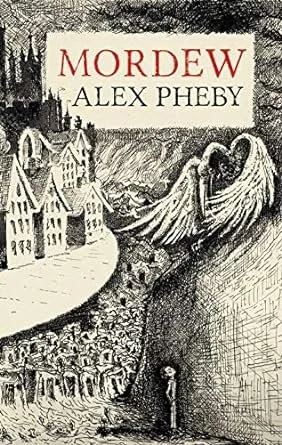Book Review: Mordew by Alex Pheby
The Synopsis
GOD IS DEAD, his corpse hidden in the catacombs beneath Mordew. In the slums of the sea-battered city a young boy called Nathan Treeves lives with his parents, eking out a meagre existence by picking treasures from the Living Mud and the half-formed, short-lived creatures it spawns. Until one day his desperate mother sells him to the mysterious Master of Mordew. The Master derives his magical power from feeding on the corpse of God. But Nathan, despite his fear and lowly station, has his own strength - and it is greater than the Master has ever known. Great enough to destroy everything the Master has built. If only Nathan can discover how to use it. So it is that the Master begins to scheme against him - and Nathan has to fight his way through the betrayals, secrets, and vendettas of the city where God was murdered, and darkness reigns...
The Review
One of the many joys of small press and indie is how ready they are to publish unconventional works that take bold risks and strike out into spaces that traditional publishers don’t see as commercially viable. The benefits to this, of course, is that you get stories that defy both expectation and categorization, providing truly worthwhile horizon-expanding reading experiences. None of this is necessary to count yourself as a booklover, but that is the cohort that Mordew finds its place with, and that alone makes it worth putting on your radar.
The greatest boon Mordew puts forward is its author. Alex Pheby has an idiosyncratic style to his writing that, while alone taking a literary approach, also synergises exceptionally well with the gothic horror dressing to the world. His way of tackling character dialogue and world building carries a weight of personality and does so much work visualising the presence characters exude. The writing made me feel like I had stepped through a portal into a Victorian era industrial town and then surrounded me with eldritch oddities; without the leap from one to the other ever feeling strange or out of place – that’s good storytelling.
I think a major element of how this book successfully marries its grounded period influenced narrative, with increasingly bizarre and cosmological happenings, is to do with how carefully plotted the progression is. Characters are young, and a central conceit of the narrative is that they don’t have a comprehensive understanding of the world, which means that their knowledge progresses alongside the readers. It is true to the characters age and circumstances, while also serving to assist the narrative development, and that’s a sharp combination.
This element is then tied to the pacing so well that it is like following a trail of breadcrumbs. It constantly establishes a desire to reach the next key moment, and as soon as you do, it shows you the next morsel just close enough for you to want to reach it. Obviously, this only functions on the basis that you’re invested in the story, but with solid themes and action, on top of all the aforementioned praise I’ve given Mordew, it does not lack for things to get attached to.
I think there is a lot going on in this book, and in some respect that might make it a challenging experience for anyone wanting or expecting something lighter. Alex Pheby also suffers from himself at times, with an almost overbearing love of similes, and perhaps most egregiously – spoiling a major plot reveal in the blurb because he is so excited by it (seriously, if you can, avoid reading it) – but if the wider writing community has taught me anything, it’s that bearing an author’s eccentricities is always worth the entry price. For me, Mordew is that rare and bold kind of work that I most enjoy championing.


